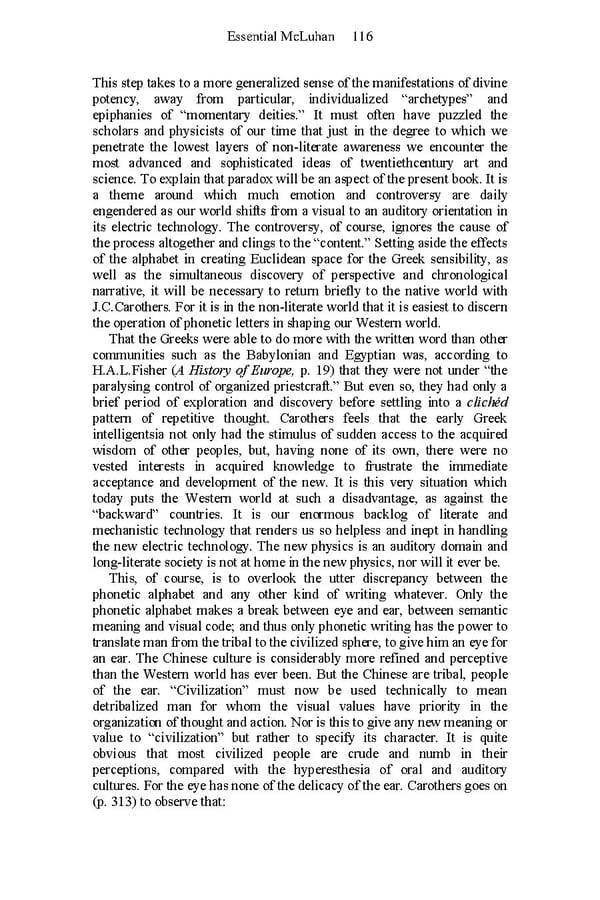Essential McLuhan 116 This step takes to a more generalized sense of the manifestations of divine potency, away from particular, individualized “archetypes” and epiphanies of “momentary deities.” It must often have puzzled the scholars and physicists of our time that just in the degree to which we penetrate the lowest layers of non-literate awareness we encounter the most advanced and sophisticated ideas of twentiethcentury art and science. To explain that paradox will be an aspect of the present book. It is a theme around which much emotion and controversy are daily engendered as our world shifts from a visual to an auditory orientation in its electric technology. The controversy, of course, ignores the cause of the process altogether and clings to the “content.” Setting aside the effects of the alphabet in creating Euclidean space for the Greek sensibility, as well as the simultaneous discovery of perspective and chronological narrative, it will be necessary to return briefly to the native world with J.C.Carothers. For it is in the non-literate world that it is easiest to discern the operation of phonetic letters in shaping our Western world. That the Greeks were able to do more with the written word than other communities such as the Babylonian and Egyptian was, according to H.A.L.Fisher (A History of Europe, p. 19) that they were not under “the paralysing control of organized priestcraft.” But even so, they had only a brief period of exploration and discovery before settling into a clichéd pattern of repetitive thought. Carothers feels that the early Greek intelligentsia not only had the stimulus of sudden access to the acquired wisdom of other peoples, but, having none of its own, there were no vested interests in acquired knowledge to frustrate the immediate acceptance and development of the new. It is this very situation which today puts the Western world at such a disadvantage, as against the “backward” countries. It is our enormous backlog of literate and mechanistic technology that renders us so helpless and inept in handling the new electric technology. The new physics is an auditory domain and long-literate society is not at home in the new physics, nor will it ever be. This, of course, is to overlook the utter discrepancy between the phonetic alphabet and any other kind of writing whatever. Only the phonetic alphabet makes a break between eye and ear, between semantic meaning and visual code; and thus only phonetic writing has the power to translate man from the tribal to the civilized sphere, to give him an eye for an ear. The Chinese culture is considerably more refined and perceptive than the Western world has ever been. But the Chinese are tribal, people of the ear. “Civilization” must now be used technically to mean detribalized man for whom the visual values have priority in the organization of thought and action. Nor is this to give any new meaning or value to “civilization” but rather to specify its character. It is quite obvious that most civilized people are crude and numb in their perceptions, compared with the hyperesthesia of oral and auditory cultures. For the eye has none of the delicacy of the ear. Carothers goes on (p. 313) to observe that:
 Essential McLuhan Page 122 Page 124
Essential McLuhan Page 122 Page 124